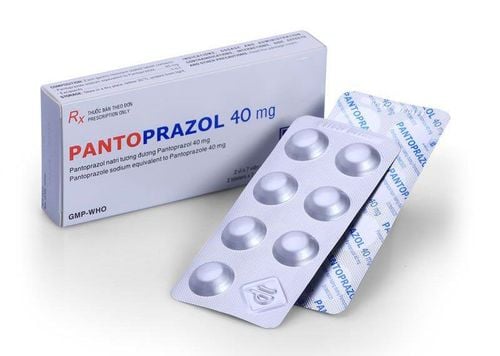This is an automatically translated article.
The article was professionally consulted by Specialist Doctor II Cao Thi Thanh - Pediatrician - Department of Pediatrics - Neonatology - Vinmec Hai Phong International General Hospital. Dr. Thanh has worked for 25 years in the treatment of neonatal pediatric diseases.Many premature babies are diagnosed with gastroesophageal reflux disease, which causes stomach contents to back up into the esophagus. Physical immaturity and feeding patterns also play a role in this syndrome. So what should parents do to handle reflux in premature babies?
1. Causes of gastroesophageal reflux in premature babies
Reflux occurs due to transient relaxation of the lower esophageal sphincter (LES), a circular muscle at the end of the esophagus that opens spontaneously to allow food to enter the stomach, but then tightens. tight and close to prevent everything contained in the stomach from backing up into the esophagus.Reflux occurs when the LES doesn't close completely (dilates), allowing the contents of the baby's stomach to back up into the esophagus in small or large amounts, which can sometimes be seen as spitting up or vomiting. .
Transient relaxation of the LES is actually a normal phenomenon, but it may occur with greater frequency in premature infants because the infant receives relatively large amounts of liquid food while the infant is supine.
With a supine feeding position, instead of allowing gravity to pull milk into the stomach, part of the milk is located at the gastroesophageal junction. Here, milk is more likely to back up into the esophagus as the LES dilates.
Babies have shorter and narrower esophagus, which displaces the LES, which can also contribute to reflux in premature babies.

Trẻ sinh non rất dễ bị chứng trào ngược dạ dày
2. Symptoms and Complications of Gastroesophageal Reflux Disease in Premature Infants
There are many symptoms caused by gastroesophageal reflux disease (GER) in premature babies, such as:The baby is very upset. From refusing to eat or only sucking very little. Choking, vomiting in premature babies or coughing while feeding. Signs of discomfort while suckling such as arching your back or grimacing. Frequent and/or severe vomiting. In addition to the above symptoms, GER can lead to various complications, including growth retardation, esophagitis, and lung aspiration.
Research shows that premature babies with GER have a longer hospital stay than premature babies without GER. Some of these complications may contribute to longer hospital stays.

Khi bị trào ngược trẻ có thể bú ít hoặc không bú
3. Diagnosis and treatment of reflux in premature infants
3.1. Diagnosis of reflux in premature infants
Most cases of GER in preterm infants are clinically diagnosed, which means that the doctor will evaluate the baby for typical symptoms of GER and also rule out other medical reasons and diagnoses (eg. for example, cow's milk protein allergy, constipation, infection or neurological disorder).In some cases, the doctor may recommend a trial of acid-suppressing drugs for the child to make a diagnosis.
Less commonly, diagnostic tests such as esophageal pH measurement and multiple oral impedance monitoring are used to diagnose GER in premature infants. These tests can be technically difficult to perform, and the results can be difficult to interpret.
Esophageal pH probe: This test requires placing a thin tube called a catheter through the child's nose to enter the lower part of the child's esophagus. At the tip of the catheter is a sensor, which can measure the pH of the contents of the stomach. This information is recorded over a 24-hour period on a monitor connected to the catheter. Multiple Intraluminal Impedance: GER is detected by measured changes in the resistance of a fluid pump, as fluid moves between two electrodes located on the catheter. This information can help determine if the fluid is moving upstream (being swallowed and going towards the stomach) or retrograde (being regurgitated from the stomach).
3.2. Treatment of reflux in premature infants
The goal of GER treatment is to keep stomach contents in the stomach and from moving up the esophagus. There are many options to help with this.Although medication may be recommended, it is usually only indicated after trying non-pharmacological interventions first.
Position: After breastfeeding, many pediatricians recommend that parents keep babies in an upright position as much as possible. Keeping the baby in the prone position and on the left side can also be effective, but only if the child is awake and monitored closely.
When sleeping, babies need to lie on their backs, regardless of whether they have GER or not. In addition, children should sleep on a flat and firm mattress, with no pillows, blankets, toys or cushions. Furthermore, according to the American Academy of Pediatrics, devices used to raise the head of a baby crib should not be used. These devices are not effective in reducing GER and are also dangerous, as they increase the risk of a child rolling to change positions that can cause breathing difficulties.
Breast milk and formula: Sometimes, reflux can be related to an intolerance to certain proteins in the mother's milk. Breastfeeding mothers with reflux may be advised to eliminate certain foods that are common causes of reflux, such as milk, eggs, soy or certain meats because these proteins are can pass through breast milk.
When a baby with reflux is formula-fed, the same thing can happen when something in the formula can cause poor digestion or discomfort for your baby. In these cases, your doctor may recommend an actively-hydrolyzed formula.
Technically, these formulas are for babies who can't digest or are allergic to cow's milk protein, and they can also help reduce symptoms in kids with GER.
Adjust feeding: Research shows that feeding small amounts more often can be helpful for children with reflux syndrome. Sometimes, parents are advised to use thickeners such as cereal powder added to milk, on the grounds that thicker liquids are harder to reflux and pass out of the stomach. However, this approach is being used less and less often due to concerns about the increased risk of necrotizing enterocolitis (NEC) in premature infants. In fact, it is now not recommended that thickeners, such as xanthan gum, be used in premature or preterm infants during the first year of life.

Thành phần trong sữa công thức có thể là nguyên nhân gây trào ngược ở trẻ
Therefore, the questionable efficacy and safety of these acid-suppressing drugs should limit their use.
However, your doctor may prescribe acid-suppressing medications if non-pharmacological therapies are not helpful. There are two main medications used to treat GER in premature infants:
Histamine-2 receptor blockers: For example, Pepcid (famotidine) Proton pump inhibitors (PPIs): For example, Prilosec (omeprazole) or Nexium (esomeprazole) Both drugs (through different mechanisms) work to reduce acid secretion in the stomach. That means reflux still occurs, but it doesn't damage the esophagus.
Surgery: Fundoplication is a type of surgery in which the upper part of the child's stomach is wrapped around the LES, this technique is usually only indicated if the child is not responding to medications and the child's reflux is related to other conditions. serious (sometimes life-threatening) complications. These complications may include:
Recurrent aspiration pneumonia Children with apnea Slow heart rate Bronchopulmonary dysplasia Severe vomiting Developmental delay Esophagitis Esophageal stricture Fundoplication surgery can be performed in babies are very small and small. In studies, this surgery was performed on infants 2 weeks old and weighing about 2,000 grams.

Sử dụng thuốc không được bác sĩ chỉ định có thể làm tăng nguy cơ ở trẻ sơ sinh
4. When to see the doctor?
GER is very common in infants, especially premature babies, and usually resolves on its own. Therefore, if the baby vomits a lot but is still happy and growing steadily, parents can rest assured, the vomiting symptoms will gradually decrease and disappear.Although, GER can be uncomfortable, frequent undetected vomiting in premature babies can cause growth problems or nutrient deficiencies.
However, if a child has more worrisome signs or symptoms, parents need to take the child to the doctor, especially if the child has symptoms such as:
Does not want to eat Choking when vomiting Premature baby spits up Frequent Shows feeding discomfort (eg, crying or arching) No weight gain. Gastroesophageal reflux disease is a common disease in children, so if the condition shows no signs of improvement, the mother should soon take the child to the medical center for examination and treatment.
To prevent gastrointestinal symptoms such as acid reflux, parents should supplement their children with essential micro-minerals such as zinc, lysine, chromium, selenium, vitamin B1, ... nutrition in children. The addition of these essential vitamins also supports digestion, enhances nutrient absorption, improves anorexia, and helps children eat well. Parents can simultaneously apply dietary supplements and functional foods derived from nature for easy absorption. The most important thing is that improving your baby's symptoms often takes a long time. Combining many types of functional foods at the same time or changing many types in a short time can make the baby's digestive system unable to adapt and completely not good. Therefore, parents must be really patient with their children and regularly visit the website vimec.com to update useful baby care information.
Reference sources: babycenter.com, verywellhealth.com














